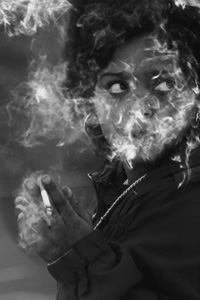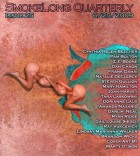“Bush Chanting.” When I first read that title, I thought it had to do with a Republican Convention. I’m glad it turned out to be something else. Why this title?
Bush, as in “African wilderness.” Nyati (enya’ tee) is transplanted from his place in the bush through the tragedy of losing everyone. (“I moved north when everyone died.”) The only way he can remain himself is by chanting what he knows to be true for sure.
One of the many images that lasts for me from this story is “dried up.” What meanings arise out of those “dried up” images?
Nyati’s prayers have dried up. His ancient culture prayers were to the moon, the sun, the stars. As the only one left of his people, he has no collective religion for support. He developed his own way of staying grounded, and safe from the perils. He does not consider English a language, nor Afrikaans. He uses what he has to, but the only languages he recognizes are totally African.
If my school teachers taught this story, they might say it’s a man versus nature story. What does such a label get right? What might it miss about this piece?
The word versus trips me up. The only harmony and safety Nyati has is in his relationship with nature. In a way, he lives on a planet for one person, himself. Who and what he loved, knew, valued, wanted, is gone. He makes do. He is out of place, displaced, misplaced. He stays connectd to his mother earth and has little use for anyone or any thing.
Tell us all you can about the nine years spent on the continent of Africa.
(laughing) All I can? That might take, well, about nine years. I joined Peace Corps in my 30s and was sent to a village on a big river and a small river in the Congo rain forest, one degree south of the equator. I was there for over 3 years. Every step I took was on the bare earth, whether puffy dusty steps or slogging muddy ones. I loved this and knew it to be healing. I felt deep understanding for the first time. Long before I could communicate in local languages, I could feel people reading me and I felt at peace. Those three years were deeply nurturing. I ate only earth’s offerings, slept and rose with the moon and sun as the only light source, and very soon my heartbeat changed to match the rhythms of drumming and chanting, voices raised in song, lament, wonder, anger. I had many, many hair raising moments as well. I was totally there, and felt I’d come home. I still have not found that kind of comfort back in the US. After a few years in the states—a masters degree, 4 years teaching at the Naval Postgraduate School, running a program I designed for international military officers, I sold what I had and went to Cape Town, South Africa. Before the Vote, before Mandela was freed. Tensions were high. A goodwill ship came into port from Taiwan, carrying on board about 11 of my former students at the Navy school. Theirs were the first smiles I’d seen since my arrival 4 months earlier. While there, I used my camera skills and writing skills (before the digital age) to document and do what I could while quietly living on a tourist visa. Right now I’m breaking out in a sweat, so I will move on. I hope one day I can linger in memory long enough to write it all down. I lived very near the former concentration camps. Peace Corps had just come to neighboring Zimbabwe. At age twelve, the new country had a lot going in its favor. I was offered a job and went north eagerly, fleeing. I designed a new program for training local teachers to train incoming volunteers. Four months later I realized I wanted to stay on and work with Africans. I made up work for myself for the next 5 plus years, designing an environmental training program for Anglo American companies—training senior managers to become trainers for the lower levels, including the laborers and their families. I also documented wildlife programs and safari destinations, which kept me on safari at times. There were many adventures and close calls, but overall, Zimbabwe was very high functioning in those days.
What stories have yet to be told?
OMG. I am learning to release the stories that must be told, that have been held back. The stories I never wrote home about. The story of the village ‘fool’ who used to come to the edge of my verandah and recite poetry in French, stopping in the middle of a word if I blew out my candle. His footprints would be in the sand the next morning if the night rains held off. He was harmless. He was fed and cared for wherever he drifted. He was protected, much as a wandering child. We heard a few months later that soldiers had stoned him to death in a public toilet in a much bigger town 250 k west. I was ruined by that story but could not say anything aloud, as soldiers and their spies were everywhere and could disappear people for less. I saw things in nature I never knew could be observed by the eye or by a person sitting around. Lucky for me I was born a keen observer. I had many rewards. I saw way too many dead people. I recognized babies I helped deliver when I came across them in my travels by bicycle to visit my outlying students. In one place I found part of a human skull on the plain while bushwalking (no trail, just walking out across the landscape). I once touched the very tip of the tail of an 18ft forest python, thinking it was way ahead and ‘wouldn’t feel’ my touch. It whipped around, slowed only slightly by the tall grass, its path across the dusty road deeply grooved. I jumped back to the safety of the car, my friend’s baby still in my arms. I was so happy she could not yet talk! “how was the safari drive?” her mother asked me. “fine.” I said. Over and out. Stay tuned! Thanks for believing in this story, which started out as a character study. Nyati is in several other stories. I have a loose-knit series of connected stories brewing. All set in Africa, natch.



 In its third year, The March Micro Marathon will be, as usual, a prompt-a-day whirlwind for 24 days. You’ll exchange drafts of micro fiction, non-fiction, and prose poetry in small groups and gather for a series of online events (all recorded for participants unable to attend live). We’ll finish with 3 competitions, and participants who are not already in SmokeLong Fitness will be invited to workshop with SmokeLong Fitness until the end of April!
In its third year, The March Micro Marathon will be, as usual, a prompt-a-day whirlwind for 24 days. You’ll exchange drafts of micro fiction, non-fiction, and prose poetry in small groups and gather for a series of online events (all recorded for participants unable to attend live). We’ll finish with 3 competitions, and participants who are not already in SmokeLong Fitness will be invited to workshop with SmokeLong Fitness until the end of April!